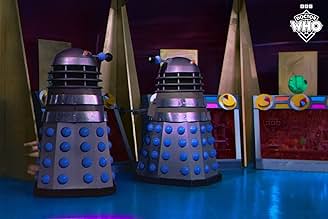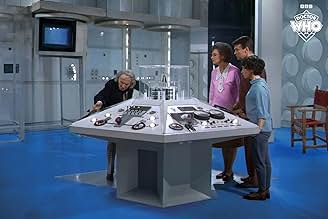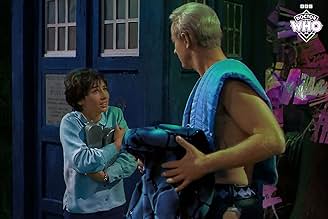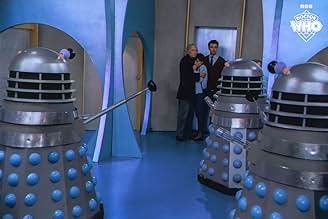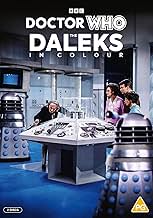Agrega una trama en tu idiomaAs part of the 60th anniversary celebrations of Doctor Who, the first Dalek story has been dazzlingly colourised and weaved into a 75-minute blockbuster.As part of the 60th anniversary celebrations of Doctor Who, the first Dalek story has been dazzlingly colourised and weaved into a 75-minute blockbuster.As part of the 60th anniversary celebrations of Doctor Who, the first Dalek story has been dazzlingly colourised and weaved into a 75-minute blockbuster.
William Hartnell
- The Doctor
- (material de archivo)
William Russell
- Ian Chesterton
- (material de archivo)
Jacqueline Hill
- Barbara Wright
- (material de archivo)
Carole Ann Ford
- Susan Foreman
- (material de archivo)
Alan Wheatley
- Temmosus
- (material de archivo)
Philip Bond
- Ganatus
- (material de archivo)
Virginia Wetherell
- Dyoni
- (material de archivo)
Marcus Hammond
- Antodus
- (material de archivo)
Jonathan Crane
- Kristas
- (material de archivo)
Gerald Curtis
- Elyon
- (material de archivo)
David Graham
- Dalek Voices
- (archivo de sonido)
Peter Hawkins
- Dalek Voices
- (archivo de sonido)
Robert Jewell
- Dalek
- (material de archivo)
Kevin Manser
- Dalek
- (material de archivo)
Peter Murphy
- Dalek
- (material de archivo)
Michael Summerton
- Dalek
- (material de archivo)
Gerald Taylor
- Dalek
- (material de archivo)
- Dirección
- Guionista
- Todo el elenco y el equipo
- Producción, taquilla y más en IMDbPro
Opiniones destacadas
It should be noted that one of the BBC's stipulations regarding this colourized release of The Daleks, was that it needed to be kept to a 75 minute run time. There was no going against this order. The production crew obviously did their best to pare down the original 175 minutes, but the result is a disjointed mess.
The colourising is for the most part beautifully accomplished. One hopes this process will be put to other classic black & white episodes of the series. However, if any further conversions are produced, editing should be better controlled if not entirely abandoned. As presented, The Daleks-Colourized is 75 minutes of choppy story telling. Many scenes are rushed and others seemingly disorganized. In some instances, characters that were in a scene one moment, are gone the next, though they are not seen leaving nor given time to leave. In another instance, the Doctor and others are trapped on the upper floors of a tower, soon after they are on the edge of entering a jungle with no intervening explanation of their escape.
Other than editing, newly produced music pours over scenes like invading slime, covering dialogue and clashing with action. Choice of music during a scene set in the Dalek Control Room is ponderously bizarre. New special effects, however, are for the most, excellent. Hopefully additional colourized episodes of B&W Doctor Who will be produced without unjust editing. Soundtracks, if not religated to the original, should have a better fit and volume.
A worthy experiment, especially for the brillance of colour. A rating of 5/10 from me.
The colourising is for the most part beautifully accomplished. One hopes this process will be put to other classic black & white episodes of the series. However, if any further conversions are produced, editing should be better controlled if not entirely abandoned. As presented, The Daleks-Colourized is 75 minutes of choppy story telling. Many scenes are rushed and others seemingly disorganized. In some instances, characters that were in a scene one moment, are gone the next, though they are not seen leaving nor given time to leave. In another instance, the Doctor and others are trapped on the upper floors of a tower, soon after they are on the edge of entering a jungle with no intervening explanation of their escape.
Other than editing, newly produced music pours over scenes like invading slime, covering dialogue and clashing with action. Choice of music during a scene set in the Dalek Control Room is ponderously bizarre. New special effects, however, are for the most, excellent. Hopefully additional colourized episodes of B&W Doctor Who will be produced without unjust editing. Soundtracks, if not religated to the original, should have a better fit and volume.
A worthy experiment, especially for the brillance of colour. A rating of 5/10 from me.
So is it Worth the Watch? Yes. Although I think this should've been longer, making it less rushed, the colourisation and audio restoration is incredible, as is the updated score (although heavy handed at times) and special effects. It's not as successful as the original in regards to maintaining the eerie and uneasy atmosphere, but if you don't want to spend 3 hours watching the original, then put this on instead. Just like the original, it's good, but just not quite as good, although I would still personally watch this over the Original as it's much shorter. So it's definitely not bad.
The Daleks in Colour: 7/10.
The Daleks in Colour: 7/10.
On viewing this so called film, it was at the beginning just rushed and ruined, it is far more superior in the TV series, The music soundtrack was a mess with too much dominating every scene you watch, on this it seems that let's put some music here and hope for the best, but most of all the editing from 175 minutes down to 75 minutes was not enough time, it even worked at the normal 95 minutes, but it in common sense would still have. Been rubbish, the people who produced this need to be sacked
Modern blockbuster of which they tried to make made it even more of a shambles.
The colourisation of the TV show was not bad, In all the BBC have failed at this project, please stick to the original TV Doctor Who: The dead Planet.
The colourisation of the TV show was not bad, In all the BBC have failed at this project, please stick to the original TV Doctor Who: The dead Planet.
I really enjoyed this episode! The colorization is absolutely fantastic-it's done with great attention to detail, making the visuals feel natural and immersive. Seeing these classic moments in color brings a whole new level of appreciation for the story and performances. The quality is top-notch, and it really enhances the viewing experience. I hope more episodes get the same treatment in the future. It would be amazing to see even more classic Doctor Who stories brought to life in color!
I really enjoyed this episode! The colorization is absolutely fantastic-it's done with great attention to detail, making the visuals feel natural and immersive. Seeing these classic moments in color brings a whole new level of appreciation for the story and performances. The quality is top-notch, and it really enhances the viewing experience. I hope more episodes get the same treatment in the future. It would be amazing to see even more classic Doctor Who stories brought to life in color! The added depth and vibrancy make everything feel fresh while still respecting the original vision. A fantastic job!
I really enjoyed this episode! The colorization is absolutely fantastic-it's done with great attention to detail, making the visuals feel natural and immersive. Seeing these classic moments in color brings a whole new level of appreciation for the story and performances. The quality is top-notch, and it really enhances the viewing experience. I hope more episodes get the same treatment in the future. It would be amazing to see even more classic Doctor Who stories brought to life in color! The added depth and vibrancy make everything feel fresh while still respecting the original vision. A fantastic job!
Since Doctor Who returned to our screens nearly twenty years ago now, those familiar with its 20th century incarnation have likely had a pecuilair thought from time to time: what would the old series have looked like if it been made like that? In time for Doctor Who's 60th anniversary in 2023, that is exactly what happened with The Daleks in the form of a 75 minute colorized version. Would the final result be blasphemy or a revelation?
To make the idea work, one needs a serial that actually benefits from being given something a more modern polish and pace. That first Daleks serial is such an example. Yes, it's the first Dalek story, a classic, and the thing that perhaps singlehandedly guaranteed that Doctor Who would have a future beyond 13 episodes. On the other hand, given the Peter Cushing film managed to cut Terry Nation's scripts down to about 80 minutes, it's clearly a story with more than a fair amount of padding. This new edit from Benjamin Cook proves that by offering a fast-moving version of it that, honestly, doesn't lose much in terms of actual plot. Indeed, condensing things like the cave trek to the city by Ian and Barbara alongside the Thals improves rather than detracts.
And what of the colorization? On the whole, it looks remarkably good. The color choices are vivid, evoking the Technicolor spectacle of the Cushing film while also making some decisions of its own such as giving Barbara a bright pink blouse. It's something that is immensely effective except in a handful of shots where the original film quality isn't great to begin with. On the audio front, the new sound mix from Mark Ayers adds so much depth, especially considering the "as live" nature of the original recording limited the soundscape beyond what could be played into the studio. Perhaps the prime example of Ayers new work comes in the scene where Ian and the Doctor pull the creature out of the Dalek shell. An already memorable moment, it has never been more chilling than it is with the added creature sound effects. Tip of the hat, too, on the score from Ayers that wonderfully compliments the original Tristram Cary score by and large.
Is it perfect? No, of course it isn't. It does get flashback heavy in places, yes, a necessity to cover some of the editing choices made by Cook. The escape sequence where Ian is in the Dalek plays out as a nice heist like scene but the cutting back and forth is rapid to the point of approaching confusion. It perhaps wouldn't have been a bad thing to take a further cue from the Cushing film and it let run to 80 minutes to give it a bit more chance to breathe. And, like with much of Modern Who, there are times when the sound mix and music does threaten to intrude on dialogue.
Is it a worthwhile venture? For this reviewer, undoubtedly. Can I see why some Classic Who fans feel it to be at best unnecessary or, at worst, an attempt to invalidate a classic? To an extent, yes. It's something that, along with criticism of The Daleks in Color pre-broadcast comes from those who have the view of Classic Who and archive TV in general as something sacred and untouchable. Things which, as Russell T Davies says in the making of included on the Blu-Ray release, it isn't meant to be viewed solely as museum pieces. Or, indeed, lest we forget that museum's renovate to find new ways of presenting things to visitors.
That is ultimately what The Daleks in Color accomplishes. It's an engaging vision of a classic story, one that ultimately preserves the best of what could have been a moribund museum piece and shows it in a whole new light (or, rather, color). Does it replace the original? Nope, it's even included as an extra on the Blu-ray release. The result is a revelation for fans of Classic and Modern Who alike and one that they can relish partaking in for years to come.
To make the idea work, one needs a serial that actually benefits from being given something a more modern polish and pace. That first Daleks serial is such an example. Yes, it's the first Dalek story, a classic, and the thing that perhaps singlehandedly guaranteed that Doctor Who would have a future beyond 13 episodes. On the other hand, given the Peter Cushing film managed to cut Terry Nation's scripts down to about 80 minutes, it's clearly a story with more than a fair amount of padding. This new edit from Benjamin Cook proves that by offering a fast-moving version of it that, honestly, doesn't lose much in terms of actual plot. Indeed, condensing things like the cave trek to the city by Ian and Barbara alongside the Thals improves rather than detracts.
And what of the colorization? On the whole, it looks remarkably good. The color choices are vivid, evoking the Technicolor spectacle of the Cushing film while also making some decisions of its own such as giving Barbara a bright pink blouse. It's something that is immensely effective except in a handful of shots where the original film quality isn't great to begin with. On the audio front, the new sound mix from Mark Ayers adds so much depth, especially considering the "as live" nature of the original recording limited the soundscape beyond what could be played into the studio. Perhaps the prime example of Ayers new work comes in the scene where Ian and the Doctor pull the creature out of the Dalek shell. An already memorable moment, it has never been more chilling than it is with the added creature sound effects. Tip of the hat, too, on the score from Ayers that wonderfully compliments the original Tristram Cary score by and large.
Is it perfect? No, of course it isn't. It does get flashback heavy in places, yes, a necessity to cover some of the editing choices made by Cook. The escape sequence where Ian is in the Dalek plays out as a nice heist like scene but the cutting back and forth is rapid to the point of approaching confusion. It perhaps wouldn't have been a bad thing to take a further cue from the Cushing film and it let run to 80 minutes to give it a bit more chance to breathe. And, like with much of Modern Who, there are times when the sound mix and music does threaten to intrude on dialogue.
Is it a worthwhile venture? For this reviewer, undoubtedly. Can I see why some Classic Who fans feel it to be at best unnecessary or, at worst, an attempt to invalidate a classic? To an extent, yes. It's something that, along with criticism of The Daleks in Color pre-broadcast comes from those who have the view of Classic Who and archive TV in general as something sacred and untouchable. Things which, as Russell T Davies says in the making of included on the Blu-Ray release, it isn't meant to be viewed solely as museum pieces. Or, indeed, lest we forget that museum's renovate to find new ways of presenting things to visitors.
That is ultimately what The Daleks in Color accomplishes. It's an engaging vision of a classic story, one that ultimately preserves the best of what could have been a moribund museum piece and shows it in a whole new light (or, rather, color). Does it replace the original? Nope, it's even included as an extra on the Blu-ray release. The result is a revelation for fans of Classic and Modern Who alike and one that they can relish partaking in for years to come.
¿Sabías que…?
- ConexionesEdited from Doctor Who: The Dead Planet (1963)
Selecciones populares
Inicia sesión para calificar y agrega a la lista de videos para obtener recomendaciones personalizadas
Detalles
- Tiempo de ejecución
- 1h 15min(75 min)
- Color
Contribuir a esta página
Sugiere una edición o agrega el contenido que falta

